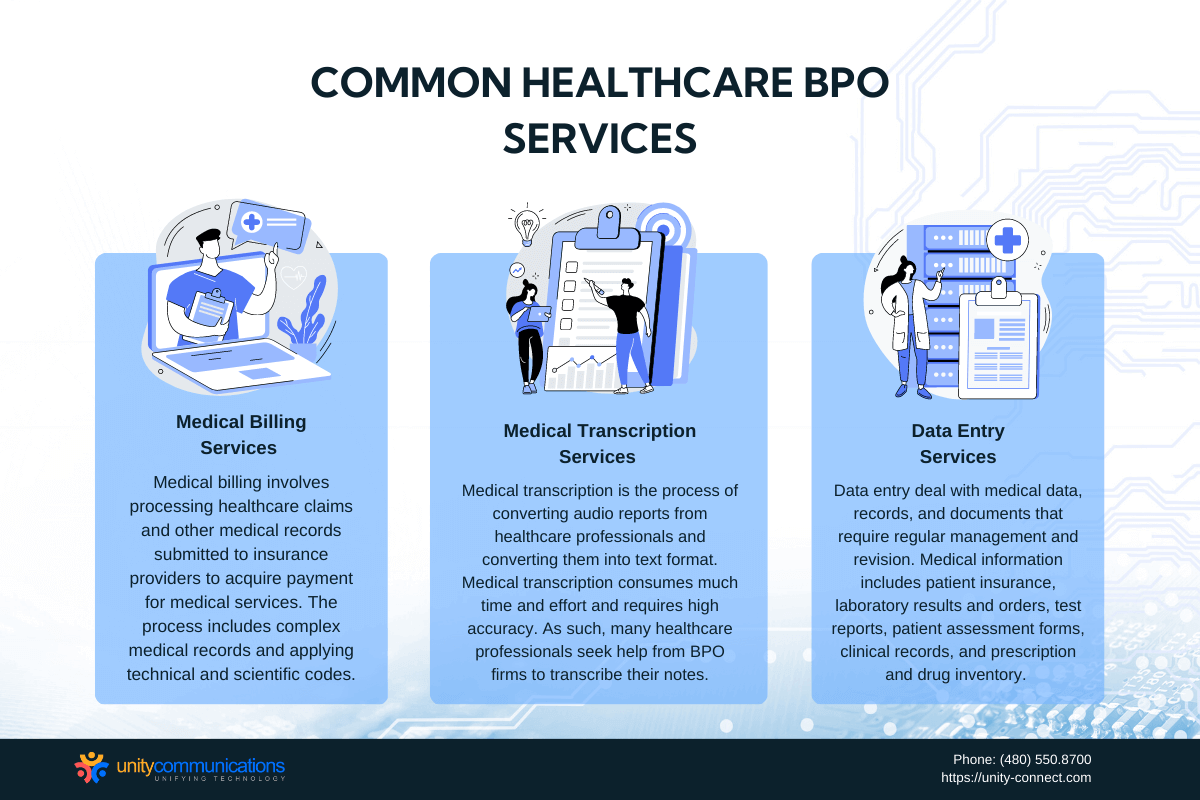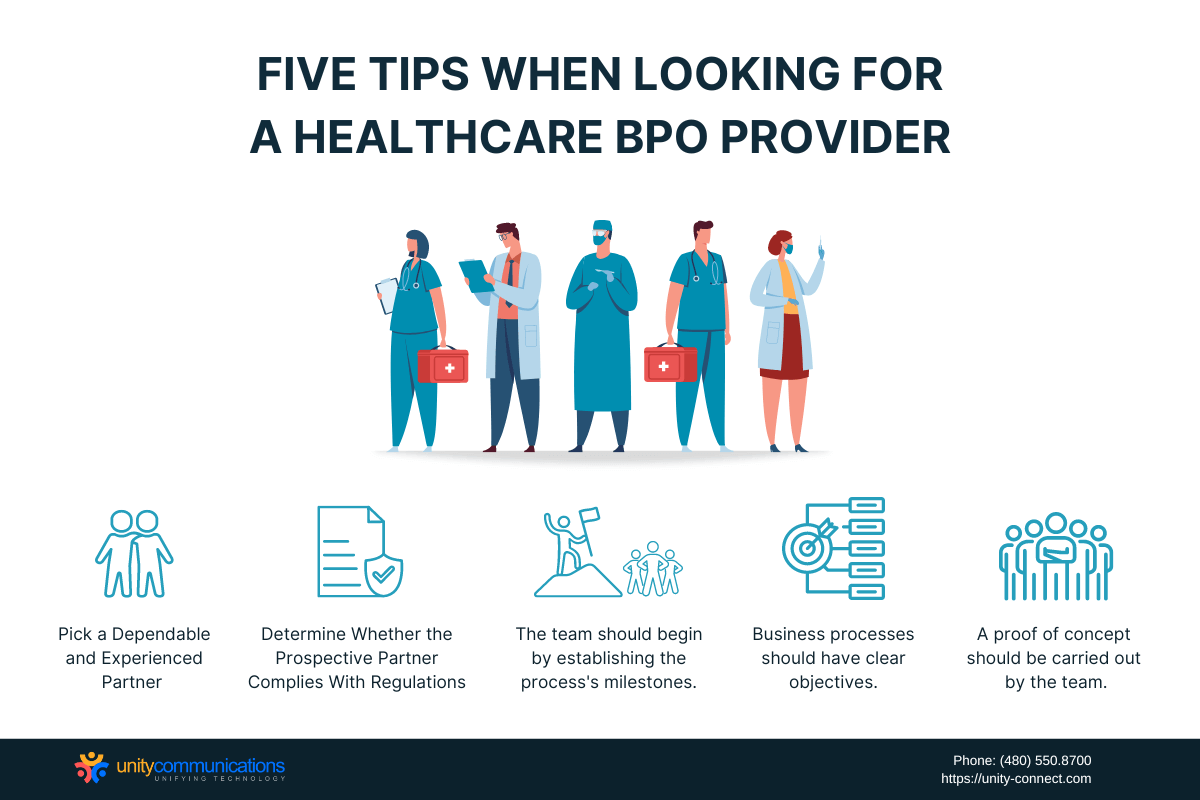Written by Rene Mallari
Contents
Now that healthcare organizations are increasing the number of patients they see, the administrative work they must do has also increased – potentially causing problems. Erroneous paperwork denied medical claims, and delayed reimbursements are a few that come to mind.
If these situations sound familiar, you need an outside expert to help you manage your healthcare business. A business process outsourcing (BPO) provider can address these challenges and ease the burden on your organization.
But what is a healthcare BPO company?
This article guides you through definitions, benefits, service types, processes, and more. You will also get valuable tips for finding the right BPO partner.
What Does Healthcare BPO Mean?

Healthcare BPO is when a healthcare provider assigns clinical or non-clinical tasks to a BPO company.
Healthcare organizations that outsource include:
- Hospitals
- Doctors’ clinics
- Outpatient clinics
- Orthodontics and dental offices
- Laboratories and diagnostics centers
- Nursing homes and assisted-living facilities
- Specialists’ offices and clinics
- Oncology clinics
- Dermatology offices
A BPO provider specializes in outsourcing front- and back-end processes. Its primary duty is to manage these functions for clients based on a set of quantifiable measurements called key performance indicators (KPIs).
The front- and back-end segments cover different healthcare operations, such as:
- Finance and accounting
- Revenue cycles
- Information technology (IT)
- Patient relations
- Insurance claims
- Team member upskilling and training
- Supply chains
- Human resources (HR)
How Does the Healthcare Industry Use BPO?
Certain processes are difficult for a lone healthcare provider. It adopts BPO services for extra manpower and expertise when times get tough. This allows them to dedicate more resources to their core service: patient care.
Below are examples of processes a BPO company can handle.
- Medical billing. Healthcare firms generate medical records and documents daily. One way to process such large amounts of paperwork is to outsource their medical billing services to a BPO firm. BPO service providers are sure to follow a set of standards and policies to address medical coding and billing issues.
- Clinical services. Medical companies outsource clinical services, including diagnostic imaging, therapy, and pharmaceuticals.
- Data collection and analysis. Third-party vendors make any healthcare professional’s life easier. They offer advanced technologies that gather and analyze medical data quickly. Technology even aids in data management processes for clinical research, health outcomes, and billing.
- HR services. Once hired, a BPO firm handles personnel administration and benefits assistance. This means it provides the database necessary to support the HR team. Medical organizations themselves no longer need to hire and train additional full-time employees.
- Data entry services. As part of its offerings, a BPO firm can organize and input medical data into a computer system for database management. Data includes patient profiles, insurance details, lab reports, and prescriptions.
- Hospital infrastructure management. Medical institutions need a BPO provider to oversee infrastructure aspects such as maintenance and procurement, waste management, security, patient transport, and equipment planning.
- IT system integration and administration. Digitalization and system integration are essential in the healthcare industry. But healthcare organizations often need a little help in this department. A third-party vendor can manage IT functions, including cloud computing systems, electronic health records, and online billing and payment processes.
Why Does the Healthcare Industry Need BPO Services?

Medical organizations tap into healthcare BPO services for seven reasons. These are to:
- Reduce expenses. Outsourcing specific functions saves time, money, and effort. Healthcare companies can focus on their core mission when they do not need to worry about recruiting and training people.
- Decrease processing errors. A service provider makes sure non-core activities are error-free. Further, it assists medical organizations with information management, data processing, data entry, data mining, and data cleansing.
- Enhance medical practice quality. Healthcare professionals outsource to improve their service level. A BPO partner helps them deliver first-rate medical services to patients and clients. Such quality leads to retention and loyalty, resulting in sustained or higher earnings.
- Use advanced technologies. A healthcare BPO provider uses the latest technologies and IT systems to collaborate more efficiently with clients. These tools ensure that clients receive outsourcing services according to plan.
- Gain access to expertise. Often, a BPO partner has subject matter experts and professionals on call. They are familiar with medical practices, billing procedures, and coding systems. They are also well-informed about industry standards such as the International Classification of Diseases (ICD) and Current Procedural Terminology (CPT).
- Focus on core competencies. A service provider enables healthcare companies to focus on patient care and treatment. Non-core functions are time-consuming and repetitive, so they are best left to a third-party specialist.
- Reduce in-house workloads. A third-party vendor reduces in-house work volume. It has skilled agents who can support your in-house team with different tasks.
Which Processes Does the Health Industry Outsource?
Non-core functions are critical to a healthcare organization’s operation. And they sometimes account for a big chunk of the business costs. A BPO firm can manage these secondary activities at reasonable service rates to enhance productivity and reduce expenses.
Explore some non-core processes the industry can outsource to a service provider below.
- Revenue cycle management (RCM) uses dedicated software to monitor services such as registration, appointment scheduling, and payment.
- Claims management is the process of filing, organizing, and updating insurance claims associated with patient diagnoses, medications, and treatments. It alerts patients of their due payments and the medical services they receive.
- Finance and accounting involve managing finances, bookkeeping, budgeting, and auditing. A BPO provider can monitor economic and business developments that affect a healthcare provider’s operations and resources.
- Customer relationship management (CRM) entails communicating with patients and other medical recipients. BPOs provide provides patients with accurate information, helpful insights, and valuable assistance.
- Supply chain management organizes and provides the resources that a medical firm must send to designated recipients. The healthcare supply chain system is complex; it involves acquiring resources, handling stock, and delivering resources to various groups.
- IT administration involves managing IT systems for coding and billing, patient databases, electronic health-related data, and payment systems.
- Patient management includes the guidelines healthcare firms adhere to, to meet patients’ changing requirements. This is a set of instructions used to build and maintain patient relationships outside treatment.
- HR supervision and employee training are the processes of hiring, onboarding, and managing personnel. Employee training also involves providing education and skill programs to staff.
What Are the Common BPO Services in the Healthcare Industry?

To give you a better idea of where to start, here are the most popular healthcare services outsourced to BPO companies:
1. Medical Billing Services
Healthcare providers deal with large quantities of complex medical records and bills prone to errors and delays when mishandled. Medical bills and invoices apply technical and scientific codes such as the following:
- Healthcare Common Procedure Coding System (HCPCS) is a set of codes explaining the policies, products, services, and supplies that public and private health insurance beneficiaries can receive.
- ICD is a group of diagnostic codes released by the World Health Organization to categorize diseases. It is regularly updated, and ICD-11 is the latest version as of January 2022.
- CPT codes are in numeric or alphanumeric characters (e.g., 0503F, E0720, and 97760) and are assigned to surgical, medical, and diagnostic services. Insurers rely on CPT to determine the amount to pay claimants.
- Diagnosis Related Group (DRG) is a system used by public insurance providers such as Medicare and private insurers to classify hospitalization expenses. It helps them identify how much to pay for a patient’s use of hospital services and facilities.
2. Medical Transcription Services
Healthcare organizations continue to generate a high volume of patient data and documents. But medical transcription consumes a great deal of time and effort. Writing notes and documents hamper doctors, nurses, and other medical employees from focusing on patient care.
As a result, many healthcare professionals seek help from BPO firms to transcribe their notes. Healthcare BPO companies offer practical benefits such as high accuracy. Hence, the demand for medical transcription services is increasing.
3. Data Entry Services
Healthcare providers outsource to deal with the medical data, records, and documents that require regular management and revision. Examples of medical information are:
- Patient insurance
- Laboratory reports and orders
- Test reports
- Patient assessment forms
- Clinical records
- Nursing records and progress notes
- Prescriptions and drug inventory
The data-entry outsourcing market is expected to grow by $351.84 million between 2019 and 2023, posting a compound annual growth rate (CAGR) of nearly 5% during the four years. This growth is mainly attributed to the growing popularity of the data entry service. The healthcare industry’s need for cost-effective solutions also contributes to the expansion.
Why Should You Consider BPO?

Consider these six benefits when outsourcing your healthcare processes to a BPO provider:
1. Compliance
A BPO company meets your compliance and security requirements, updates you on government policy changes, and follows the latest industry practices. The federal government and independent associations regularly track the sector’s data security procedures. This protects patients from the illegal use of their sensitive and private information.
Non-compliant organizations might face fines or imprisonment, depending on their violation. Established BPO firms avoid this by using advanced data security technologies to safeguard critical information.
2. Multiple Communication Support
A third-party vendor uses various communication channels to offer continuous support to clients. Patients can contact healthcare providers using fixed-line or mobile phones, live chat, social media, email, short messaging service, or self-service portals.
Here are the benefits of a diverse communication service:
- Communication is smooth and continuous regardless of a patient’s location.
- Your medical practice can deliver a faster response for better patient service.
- You have a higher chance of retaining patients because you are easily accessible.
- You can automate patient outreach by setting regular prompts for appointments and patient feedback.
3. Reasonable and High-quality Services
Affordability is the biggest advantage when delegating processes to a BPO firm. Many service providers have operations in Asia, Eastern Europe, and Latin America. These regions have an abundant supply of low-cost and skilled talent. BPO firms can offer cost-effective rates for their services.
The healthcare services industry comprises different third-party vendors competing for a sizable market share. They offer lower service fees to outpace their rivals and draw more clients.
4. Greater In-house Staff Morale
Outsourcing medical BPO services improve employees’ job outlook and satisfaction. Workers receive help with tedious, drawn-out, and complicated activities, freeing up their time and allowing them to take on more important office tasks.
Delegating back-office and administrative processes empowers in-house staff because they can assume duties more suited to their skills, increasing productivity and fulfillment.
A BPO provider has experience handling repetitive and highly detail-oriented back-end tasks. They can mitigate employee workloads and ease the pressure of completing urgent paperwork.
5. Flexible and Scalable Operations
A service provider adapts according to your operations and requirements. It can supply more contractors during expansion or when your organization experiences more patient visits and billing processes. The BPO partner can also reduce the team size under unfavorable market conditions.
Scalability means you do not need to pay the third-party vendor a fixed fee for its services. The amount depends on the number of outsourced workers hired for your processes. You pay more when business is booming and pay less during a downturn.
In addition, you can outsource specific processes and not others. This flexible and fractional approach spreads the workloads between the in-house team and the BPO provider. Your in-house team can focus on high-value tasks while your BPO partner deals with more repetitive, lower-value tasks.
6. Higher Revenue
A BPO firm monitors insurance claims and patient payments. It follows up on unsettled claims or partially settled bills. It continues to do so until your office is fully paid. The service provider uses its customer support team to promptly, professionally, and correctly collect payments.
In other words, the third-party vendor enhances a healthcare organization’s cash flow. It also accelerates payment approval by reducing coding and billing mistakes in invoices and insurance claims.
How To Look for the Right Healthcare Service Provider

Below are five tips to keep in mind when seeking the ideal healthcare BPO provider to work with.
1. Pick a Dependable and Experienced Partner
Ensure that the BPO company you choose is client-oriented, prioritizing requirements and processes regardless of your size. Responsiveness is a metric to check reliability. The service provider must deliver the services promptly and accurately to maximize payment collection and productivity.
Experience is also a vital element when searching for a reliable partner. The more extensive the prospect’s background, the more competent it is in resolving issues and adjusting to changes in government healthcare regulations and industry policies.
2. Determine Whether the Prospective Partner Complies With Regulations
Partner with a BPO firm that complies with the Health Insurance Portability and Accountability Act of 1996 (HIPAA), which mandates the healthcare industry to safeguard patients’ personal health information (PHI). It guarantees PHI protection from unauthorized access or disclosure. It also covers electronic medical records (EMR) and ICD.
A HIPAA-compliant BPO provider is not involved in shady management practices, nor does it share patient information with others. Non-compliance, if legally proven, results in heavy fines, criminal charges, and reputational damage.
3. Check the Potential Partner’s Technology Solutions and Expertise
Select a service provider equipped with the latest billing and encoding software. These technologies enhance revenue and achieve timely reimbursements from insurers. BPO providers must be capable of tackling back-office operations electronically. Choose a BPO provider capable of running secure cloud-based solutions.
You also have to ensure the BPO candidate keeps pace with developments in the coding systems. Staying updated on changing coding guidelines is critical to error-free coding and billing.
4. Stay Away From ‘Cheap’ Service Rates and Know About the Charges
Recruiting a BPO provider whose service rates are lower than the industry average is not recommended. In this case, “too affordable” is too good to be true. Before deciding, look into the prospect’s reputation, employees, and technologies.
Additionally, request a complete list of the candidate’s pricing plans, exact fees, and miscellaneous charges. You should know all the payments from the start to conduct a cost-benefit analysis. The three common payment types that BPO companies offer to healthcare clients are hourly fees, claim-based, and percentage-based.
5. Research Your BPO Candidate’s Services
Ask the potential service provider for a list of its healthcare outsourcing services. These might include:
- Claim scrubbing
- Claim denial management
- Accounts receivable management
- Analytics and reporting solutions
- Practice management software (PMS) and EMR access
- End-to-end RCM and related services
To avoid processing errors and delays, you must also examine the healthcare BPO’s medical billing system to see whether it is compatible with yours.
The Bottom Line
A healthcare BPO provider saves you money, time, and effort while letting you focus on your big picture – to save lives and promote patient well-being.
Outsourcing also improves the patient experience by providing more efficient and timely services. This allows you as a medical provider to have a long-lasting and positive image in the market.
Finding the right BPO partner can take time. Before you make a major outsourcing decision, make sure to conduct detailed research and plan accordingly.



